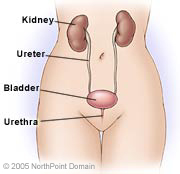Basic Facts
- Kidney cancer accounts for approximately 3 percent of adult cancers.
- Blood in urine is the most common symptom, however, kidney cancer is usually asymptomatic.
- Up to 90 percent of kidney cancers can be successfully removed if diagnosed early.
The kidneys, two small bean-shaped organs, are located on both sides the spine, below the ribcage. These organs filter waste from the blood, a process that creates urine. They also produce hormones, regulate blood pressure, and regulate the production of red blood cells.
Kidney cancer arises when kidney cells start to grow unusually rapidly and become masses known as tumors. The most common form of kidney cancer is called renal cell carcinoma. Transitional cell carcinoma is the other main form of the disease.
WHAT ARE THE SYMPTOMS?
The following bodily changes may be warning signs of kidney cancer, although they tend not to appear until the disease is advanced. Keep in mind that these symptoms can also result from other conditions such as a bladder infection or kidney disease:
- Blood in urine;
- Pain in the lower back or sides of the waist;
- A lump in the abdomen;
- Weight loss;
- Fatigue; and/or
- Intermittent fever.
CAUSES AND RISK FACTORS
It isn’t clear what causes kidney cancer, but risk factors include:
- Age, Race, and Gender: Adults in their 50s and 60s are more likely to develop kidney cancer than other age groups. Twice as many men as women are affected, and African-Americans have an increased risk.
- Genetics: In particular, the presence of an inherited cancer syndrome called Von Hippel-Lindau raises risk.
- End-stage renal disease
- Environment: Exposure to the metal cadmium, which is used in welding, soldering, and battery manufacturing, is associated with the risk of kidney cancer. Asbestos and organic solvents are also linked with the disease, as are radiation exposure and living in urban areas.
- Lifestyle: Smoking, obesity, and a diet high in well-cooked meat are associated with kidney cancer.
DIAGNOSIS
Physicians order the following tests to rule out or diagnose kidney cancer:
- Intravenous pyelogram: For this type of x ray, a contrast dye is injected into the bloodstream to allow the physician to clearly see any abnormalities.
- Ultrasound
- Computed tomography (CT) scans
- Magnetic resonance imaging (MRI)
TREATMENT APPROACH
Surgery is the mainstay of therapy for most stages of kidney cancer. Procedures include:
- A radical nephrectomy, or the removal of the kidney and the surrounding tissues;
- A partial nephrectomy, which removes the tumor or tumors and a small amount of normal kidney tissue; and
- Laparoscopic nephrectomy, a minimally invasive procedure that involves moving a camera and surgical instruments through small incisions.
When cancer spreads, immunotherapy is considered the most promising treatment. It employs drugs that stimulate the body’s own disease-fighting cells to fight cancer. Kidney cancer has proven resistant to many chemotherapeutic drugs, although some types are mildly effective.
LIFESTYLE
However, the following habits may help reduce your risk of kidney cancer:
- Stop smoking
- Maintain a healthy weight
- Avoid environmental toxins: Determine if appropriate safety practices are in place at those industrial work sites where chemicals that are known or suspected of causing kidney cancer are used.
Copyright © 2021 NorthPoint Domain, Inc. All rights reserved.
This material cannot be reproduced in digital or printed form without the express consent of NorthPoint Domain, Inc. Unauthorized copying or distribution of NorthPoint Domain’s Content is an infringement of the copyright holder’s rights.

